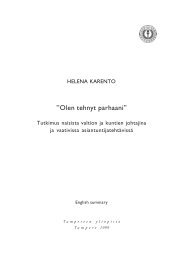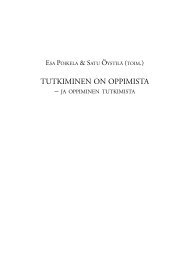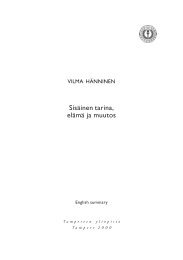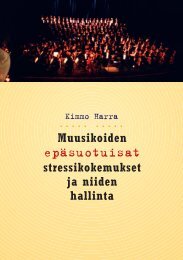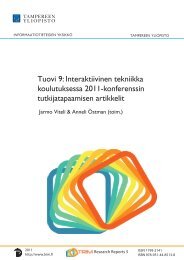Note on this edition: this is an electronic version of the 1999 book ...
Note on this edition: this is an electronic version of the 1999 book ...
Note on this edition: this is an electronic version of the 1999 book ...
Create successful ePaper yourself
Turn your PDF publications into a flip-book with our unique Google optimized e-Paper software.
The Sat<strong>an</strong>ic Verses <strong>an</strong>d <strong>the</strong> Dem<strong>on</strong>ic Text 279The repeated query <strong>of</strong> <strong>the</strong> narrator – Who am I? – could thus be givenseveral <strong>an</strong>swers (“Mikhail Bulgakov,” “Fr<strong>an</strong>z Kafka,” “Gabriel GarcíaMárquez”), depending <strong>on</strong> which narrative or <strong>the</strong>matic element <strong>is</strong> in questi<strong>on</strong>.It <strong>is</strong> justifiable to read <strong>the</strong> novel’s polyph<strong>on</strong>y as a dec<strong>on</strong>structi<strong>on</strong> <strong>of</strong> <strong>the</strong>idea <strong>of</strong> <strong>an</strong> “author”; after all, <strong>the</strong> unity <strong>of</strong> <strong>an</strong> empirical author has been usedto secure some fixed, authorial me<strong>an</strong>ings – those very same pursuits <strong>of</strong> pure<strong>an</strong>d absolute truths that The Sat<strong>an</strong>ic Verses most vehemently opposes.Rushdie himself has attempted to clarify <strong>the</strong> plurality <strong>of</strong> h<strong>is</strong> “empirical” selfby pointing out its numerous (<strong>an</strong>d potentially c<strong>on</strong>flicting) influences: amoderate Muslim home, a Chr<strong>is</strong>ti<strong>an</strong> n<strong>an</strong>ny, friends am<strong>on</strong>g Hindus, Sikhs,Pars<strong>is</strong>, <strong>an</strong>d <strong>the</strong> hotchpotch <strong>of</strong> Bombay with its movies, Hindu myths <strong>an</strong>dSpiderm<strong>an</strong> comics; “I was already a m<strong>on</strong>grel self, h<strong>is</strong>tory’s bastard, beforeL<strong>on</strong>d<strong>on</strong> aggravated <strong>the</strong> c<strong>on</strong>diti<strong>on</strong>.” 93 It <strong>is</strong> hard to find support for <strong>the</strong> reestabl<strong>is</strong>hment<strong>of</strong> <strong>the</strong> author’s intenti<strong>on</strong>s as c<strong>on</strong>clusive criteria for <strong>the</strong> literaryme<strong>an</strong>ing in The Sat<strong>an</strong>ic Verses, as Anth<strong>on</strong>y Close has attempted. In h<strong>is</strong> article,“The Empirical Author: Salm<strong>an</strong> Rushdie’s The Sat<strong>an</strong>ic Verses,” Close attacksmost literary <strong>the</strong>ory since W.K. Wimsatt’s <strong>an</strong>d M.C. Beardsley’s article“The Intenti<strong>on</strong>al Fallacy” (1946) by claiming that Rushdie’s predicament revealsits irresp<strong>on</strong>sibility. Theoretical claims <strong>of</strong> how unimport<strong>an</strong>t empiricalauthors are in c<strong>on</strong>ferring a text’s me<strong>an</strong>ing gain a “grim frivolity” as Rushdie<strong>is</strong> sentenced to death because h<strong>is</strong> intenti<strong>on</strong>s are not heard. Close argues that“me<strong>an</strong>ing <strong>is</strong> centered <strong>on</strong> <strong>an</strong> egocentric zero-point,” <strong>an</strong>d that <strong>on</strong>e should renounce“implied authors” or “act<strong>an</strong>tial roles” as needless hypo<strong>the</strong>ses. Communicati<strong>on</strong><strong>is</strong> always <strong>of</strong> <strong>an</strong> “interpers<strong>on</strong>al nature,” <strong>an</strong>d <strong>on</strong>e should identify<strong>the</strong> author “as a pers<strong>on</strong> with a specific pr<strong>of</strong>ile <strong>an</strong>d h<strong>is</strong>tory, <strong>an</strong>d with designswith h<strong>is</strong> fellow men.” 94Close’s argument for <strong>the</strong> import<strong>an</strong>ce <strong>of</strong> <strong>the</strong> empirical author has ethicalappeal <strong>an</strong>d hum<strong>an</strong>e value. However, h<strong>is</strong> c<strong>on</strong>cepti<strong>on</strong> <strong>of</strong> literature d<strong>is</strong>regardsthose d<strong>is</strong>tinctive features <strong>of</strong> textuality that The Sat<strong>an</strong>ic Verses so well illustrates.As d<strong>is</strong>cussed in chapters two <strong>an</strong>d three, nei<strong>the</strong>r “work <strong>of</strong> art” or“self” <strong>of</strong>fer shortcuts to some unproblematic unity. Both are c<strong>on</strong>tested ideas<strong>an</strong>d c<strong>on</strong>tinue to deviate radically from our comm<strong>on</strong>-sense noti<strong>on</strong>s undermore intense scrutiny. The reader <strong>of</strong> The Sat<strong>an</strong>ic Verses does not do justiceto <strong>the</strong> intricacies <strong>of</strong> <strong>th<strong>is</strong></strong> novel if he forgets how “ego” or “pers<strong>on</strong>” are <strong>the</strong>exact ideas it delights in unravelling. An interpers<strong>on</strong>al aspect <strong>is</strong> str<strong>on</strong>gly presentin <strong>the</strong> novel, <strong>an</strong>d it <strong>is</strong> a hard task not to d<strong>is</strong>cern <strong>the</strong> political <strong>an</strong>d culturalviews upheld in <strong>the</strong> text. However, <strong>on</strong>e should remember that it <strong>is</strong> in <strong>the</strong> interests<strong>of</strong> such “readers” as Ayatollah Khomeini to equate <strong>the</strong> empirical authorwith “h<strong>is</strong>” ficti<strong>on</strong>. Rushdie quoted Michel Foucault’s essay “What <strong>is</strong> <strong>an</strong>Author?” in h<strong>is</strong> Herbert Read Memorial Lecture in 1990, noting that accordingto Foucault, “authors were named <strong>on</strong>ly when it was necessary to find93 “In God We Trust” (Rushdie 1992, 377, 404); “Is Nothing Sacred?” (ibid., 425).94Close 1990, 251, 255, 256, 265.



